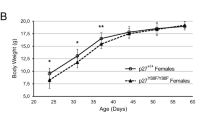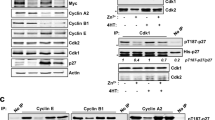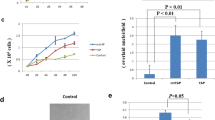Abstract
A MUTANT form of the α-isoform of protein kinase C (PKC) was recently isolated from an ultraviolet radiation-induced murine fibrosarcoma cell line and reported to transform mouse BALB/c 3T3 fibroblasts on transfection1. Four point mutations in the regulatory domain were assumed to be responsible for its oncogenicity and unusual preference for membrane localization. Here, we report that overexpression of the reported mutant PKCα complementary DNA in three fibroblast cell lines, including BALB/c 3T3, does not enable these cells to grow in soft agar or nude mice. In addition, this mutant PKCα form seems to be indistinguishable from the wild-type PKCα with respect to its dependence on co-factors, phorbol ester binding, subcellular distribution and its effects on growth and morphology. These results fail to confirm the previous study1 and indicate that overexpression of either the wild-type or the reported mutant form of PKCα does not transform rodent fibroblasts.
This is a preview of subscription content, access via your institution
Access options
Subscribe to this journal
Receive 51 print issues and online access
$199.00 per year
only $3.90 per issue
Buy this article
- Purchase on Springer Link
- Instant access to full article PDF
Prices may be subject to local taxes which are calculated during checkout
Similar content being viewed by others
References
Megidish, T. & Mazurek, N. Nature 342, 807–811 (1989).
Housey, G. M. et al. Cell 52, 343–354 (1988).
Hsiao, W.-L. W., Housey, G. M., Johnson, M. D. & Weinstein, I. B. Molec. cell. Biol. 9, 2641–2647 (1989).
Imber, R. & Fabbro, D. Cancer Res. 51, 632–638 (1991).
Cepko, C. L., Roberts, B. E. & Mulligan, R. C. Cell 37, 1053–1062 (1984).
Wigler, M. et al. Proc. natn. Acad. Sci. U.S.A. 76, 1373–1376 (1979).
Borner, C., Guadagno, S. N., Hseih, L.-L., Hsiao, W.-L. W. & Weinstein, I. B. Cell Growth Differ. 1, 653–660 (1990).
Jaken, S., Leach, K. & Klauck, T. J. Cell Biol. 109, 697–704 (1989).
Borner, C., Wyss, R., Regazzi, R., Eppenberger, U. & Fabbro, D. Int. J. Cancer 40, 344–348 (1987).
Regazzi, R., Fabbro, D., Costa, S. D., Borner, C. & Eppenberger, U. Int. J. Cancer 37, 731–737 (1986).
O'Brian, C. A., Lawrence, D. S., Kaiser, E. T. & Weinstein, I. B. Biochem. biophys. Res. Commun. 124, 296–302 (1984).
Costa, S. D., Fabbro, D., Regazzi, R., Kueng, W. & Eppenberger, U. Biochem. biophys. Res. Commun. 133, 814–822 (1985).
Author information
Authors and Affiliations
Rights and permissions
About this article
Cite this article
Borner, C., Filipuzzi, I., Weinstein, I. et al. Failure of wild-type or a mutant form of protein kinase C-α to transform fibroblasts. Nature 353, 78–80 (1991). https://doi.org/10.1038/353078a0
Received:
Accepted:
Issue Date:
DOI: https://doi.org/10.1038/353078a0
This article is cited by
-
Protein kinase C in melanoma
Cancer and Metastasis Reviews (2005)
-
Molecular signals in anti-apoptotic survival pathways
Leukemia (2001)
-
The α isoform of protein kinase C mediates phorbol ester-induced growth inhibition and p21cip1 induction in HC11 mammary epithelial cells
Oncogene (1999)
-
Regulation of protein kinase C and role in cancer biology
Cancer and Metastasis Reviews (1994)
Comments
By submitting a comment you agree to abide by our Terms and Community Guidelines. If you find something abusive or that does not comply with our terms or guidelines please flag it as inappropriate.



